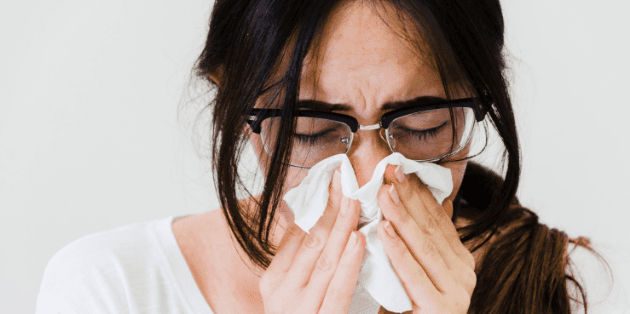What is Allergic Rhinitis?
The word Rhinitis means inflammation of the nasal mucous membranes. Allergic Rhinitis or hay fever as it is commonly known is an inflammatory condition of nasal mucosa triggered due to hypersensitivity or allergic reaction on exposure to allergens. It is characterized by spasmodic sneezing, nose block or stuffy nose, redness of eyes along with itching and watering of them.

Types of Allergic Rhinitis:
The allergic rhinitis is of two types:
- Seasonal Allergic Rhinitis – as the name suggests, it occurs mainly in spring and fall season when pollen is in abundance.
- Perennial Allergic Rhinitis – occurs throughout the year without any seasonal variation.
Symptoms
The symptoms of allergic rhinitis include
- Persistent Sneezing
- Rhinorrhoea or running nose- They can be a discharge of thin, watery fluid from the nose and in chronic cases the discharge may become thick and yellowish when sinuses are involved
- Nasal obstruction or stuffy nose
- Itching- inside the nostrils and eyes
- Lacrimation or watering of eyes
- Redness of eyes
- Sore throat and cough
- Swelling under the eyes
- Headache
- In some allergic rhinitis can also cause an allergic rash on skin.
Chronic allergic rhinitis may affect the quality of life of an individual. Sleep may be disturbed and they can feel increasing tiredness. Untreated allergic rhinitis can cause Sinusitis, ear infections and asthma.
Causes
An allergic reaction is triggered by substances known as Allergens. These allergens can be any normal substance that is usually harmless in individuals. In a hypersensitive person when exposed to an allergen it stimulates the circulating antibodies Immunoglobulin E (IgE), a part of our body’s defense mechanism. This, in turn, triggers the White blood Cells/WBC’s (Basophils and Mast cells) to release a chemical called Histamine which is responsible for the allergic symptoms. It causes blood vessels to dilate leading to local swelling and heat along with itching sensation.
The most common allergen responsible for Allergic Rhinitis is Pollen. Besides this, other common allergens responsible for allergic rhinitis are: dust mite, mold, perfumes, sawdust and insects like cockroaches
Best Homeopathy Treatment For Allergic Rhinitis:
The principle behind homeopathy treatment is to cure the person, not the disease. It’s a highly individualistic approach based on a person’s mental, physical and emotional symptoms, modalities and trigger factors not only help to shorten an attack and reduce its intensity but also helps first to reduce the frequency of attacks and reduce the need for dependency on anti-allergic and gives a long-lasting relief. It helps the allergic person to lead a normal and healthy lifestyle without any side effects. At Dr.Care homeopathy, our team of well-experienced doctors and dynamic medications has helped many in overcoming their allergic rhinitis
For more about the treatments and services offered by Dr. Care Homeopathy Call Us @ 07337557853.


